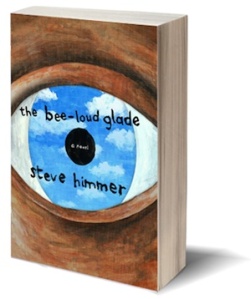 I don’t read many small-press books. Occasionally in cities, I may find books by Black Sparrow Press or Graywolf Press, but they do not often turn up at Barnes and Noble.
I don’t read many small-press books. Occasionally in cities, I may find books by Black Sparrow Press or Graywolf Press, but they do not often turn up at Barnes and Noble.
Steve Himmer’s The Bee-Loud Glade, published by Atticus Press in 2011, was recommended by Goodreads after I noted that I had readJohn Wyndham’s The Chrysalids.
Himmer’s book is one of my favorites of the year.
The Bee-Loud Glade (the title is a phrase from Yeats’s “The Lake Isle of Innisfree”) is not quite science fiction. The premise may be Wyndhamish (Goodreads thinks so), but Himmer’s voice is more akin to John Kennedy Toole’s or David Foster Wallace’s. The Bee-Loud Glade is a brilliant, comic, allegorical novel about our society’s failings, climate change, and the life of the soul.
The novel begins with the narrator, Finch, noting that last night’s storm was the loudest he’d ever heard. He can no longer see the storms well enough to measure them. We suspect we are in post-apocalyptic territory, but it turns out Finch has lived in a cave for years, originally as a paid hermit in a man-made Paradise created by a multi-millionaire, Mr. Crane. When Crane’s business crashes, Finch decides to stay in the garden.
The economy has collapsed, and the exact setting of the novel is kept vague, but we do know that city life goes on outside of the garden.
Now two hikers have encroached on Finch’s turf.
The narrative is simple but fascinating. In alternate chapters, Finch interweaves the story of his growing rage at the intrusion of the hikers who threaten his way of life with the history of his own arrival and gradual transformation by the garden. His past is very sad. He was an office drone for a “hyperefficient” (i.e., plastic) plant company, called, ironically, Second Nature. His title was assistant to the director of brand awareness. When his new submanager calls him into his office to fire him, Finch cannot explain what he did.
Finch does explain to us, though.
…I kept dozens of weblogs, and post after post shared intimate memories of the imaginary lives I’d created. Sometimes my bloggers left comments on each other’s sites, and they commented on other sites, too, drawing more traffic and potential plant buyers into my marketing web. Unless those commenters weren’t actual people, but the inventions of others with jobs like mine, the whole blogosphere a soapbox for a few busy schemers selling plastic palm trees and flavored milk drinks and guides to selling products online. Each of my imaginary bloggers had a backstory, a family or else an explainable absence of one; each had his own history of successes and failures. Second Nature’s viral campaign spanned the gamut of human behavior from borderline psychotic to contemplative, fractured English to erudition, and all of those voices and vices were mine.
Although marketing dominates the web, and I am disturbed by the ads that pursue us, there is something endearing about Finch’s marketing efforts. After he shuts down the blogs, he imagines the loss felt by readers and wonders what happens to his own characters. Jobless like so many (the majority?), Finch stays home, doesn’t shower, watches TV, and answers spam.
This last brings him to the hermit job.
Mr. Crane, who owns Second Nature, is arrogant in his creation of a woodland-garden on his estate in the middle of the city. Essentially he has created it to house the hermit, whom he will watch on film as though he is a toy. Finch is not allowed to talk, and is given whimsical orders: one day to paint, the next to play the flute, then to keep bees (he is allergic to bees). One day engineers blast the landscape, building a river in which Finch is to swim and fish. A team is hired to make snow. Finch has never seen snow.
The garden is a microcosm, and we see the Mr. Cranes changing nature and possibly destroying it. They believe they can control the future, but it is out of control.
But, oddly, Mr. Crane’s garden is a kind of Paradise. Yet climate change is at work, and it’s not quite clear where the future is going.
As Finch loses his vision, he in danger of losing his vision of the garden.
Not a perfect book, but an engaging, very well-written one.
Here are some lines from Yeats’s poem:
And a small cabin build there, of clay and wattles made;
Nine bean rows will I have there, a hive for the honeybee,
And live alone in the bee-loud glade.

I’m a great fan of smaller presses, and fortunately we have reasonable access to them here (even my local Waterstones surprised me with the amount they stock). I like the sound of this – very thought-provoking!
LikeLike
It’s very odd and entertaining, and can, of course, be ordered online. And so Goodreads does one thing right:).
LikeLike